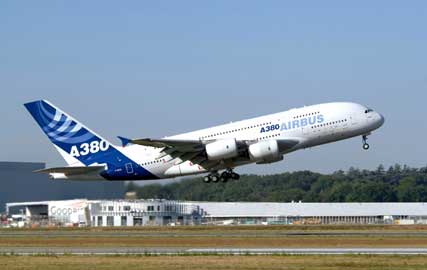Paris - The Airbus A380, the world's largest passenger jet, took to the sky
with a full load of passengers for the first time Monday, and the European
aircraft maker announced further management changes in the wake of costly delays
to the $13 billion jet program.

An Airbus A380 double-decker superjumbo takes
off for the first long-distance test flight with hundreds of passengers on
board drawn from Airbus staff and cabin design specialists in Toulouse,
southwestern France September 4,
2006. [Reuters] |
The 308-ton jet touched down Monday evening after flying a seven-hour
round-trip from Toulouse, southern France, with 474 Airbus employees on board,
on the first of four test flights scheduled this week to try out the plane's
cabin environment and systems.
Airbus says it is on schedule to deliver the first finished A380 to Singapore
Airlines Ltd. by the end of the year, despite production bottlenecks that are
expected to hold up subsequent deliveries by about six months.
The latest hitches led to the ouster of Airbus CEO Gustav Humbert as well as
Noel Forgeard, joint CEO of Airbus parent European Aeronautic Defence and Space
Co., weeks after they were announced in June.
Monday saw a further management shuffle at Airbus, which named a new head of
the A380 program. Mario Heinen, previously in charge of the single-aisle A320
plane family, replaces Charles Champion, who also steps down from his role as
chief operating officer, but stays on as an adviser to Christian Streiff, who
succeeded Humbert as CEO in July.
Streiff has imposed a temporary hiring freeze at Airbus and is scheduled to
report to shareholders by the end of this month on the full extent of the A380
delays, following a detailed audit.
With the A380, Airbus has bet heavily on future demand for very large planes
to fly growing numbers of travelers among the world's increasingly congested
major airports. In mid-sized, long-range jets, where Boeing Co. sees much more
demand, Airbus is about four years behind its US-based rival's next-generation
plane, the 787 Dreamliner, tailored to cover more destinations with more
frequent, nonstop services.
The A380 can seat 555 people in three classes, but launch customer Singapore
Airlines is expected to operate the plane with a configuration similar to the
474-seat layout chosen for the test flights with passengers.
During Monday's sortie over western Europe, about 25 cabin equipment
technicians and the remaining volunteers, chosen from 15,000 Airbus staff who
entered an internal lottery, put the super jumbo's cabin fittings and features
through their paces, testing out the seating, air conditioning, kitchens and
in-flight entertainment.
Flight tests with volunteer passengers are not a required step toward the
plane's certification but nonetheless help to ensure that "airlines will benefit
from a fully mature aircraft on delivery," Airbus said in a statement.
The super jumbo is entering the final stages of its test program, with 1,900
hours of flying time already logged by its team of test pilots. Airbus so far
has 159 orders for the plane, which is priced at $316 million.
The A380 faces another hurdle in November, when a working group within the
International Civil Aviation Organization is due to report back on the A380's
"wake vortices", air turbulence created by airliners that can be dangerous to
other planes flying close behind.
As a precaution because of its size, ICAO has temporarily set a much larger
minimum exclusion zone behind an airborne A380 than around Boeing 747 jumbos. If
adopted permanently, the rules could hold up airport traffic behind the super
jumbo and reduce the plane's efficiency.
Airbus argues that the A380 is no worse for wake turbulence than the largest
version of Boeing's 747.
BAE Systems PLC declined to comment Monday on reports that is to decide this
week whether to recommend that its shareholders approve the planned sale of the
company's 20 percent stake in Airbus.
The British defense group exercised a put-option to sell the stake back to
EADS, which owns the remaining 80 percent of Airbus, but an independent
assessment commissioned from investment bank Rothschild after negotiations broke
down valued the stake $3.52 billion, well below BAE's expectations.
In Paris, EADS shares ended 0.9 percent lower at 23.08 euros
($29.58).